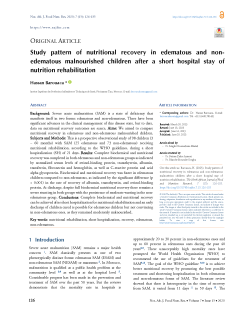Main Article Content
Study pattern of nutritional recovery in edematous and non-edematous malnourished children after a short hospital stay of nutrition rehabilitation
Abstract
Background: Severe acute malnutrition (SAM) is a state of deficiency that manifests itself in two forms: edematous and non-edematous. There have been significant advances in the clinical management of this disease state, but to date, data on nutritional recovery outcomes are scarce. Aims: We aimed to compare nutritional recovery in edematous and non-edematous malnourished children. Subjects and Methods: This is a prospective observational study of 98 children (3 – 60 months) with SAM (25 edematous and 73 non-edematous) receiving nutritional rehabilitation, according to the WHO guidelines, during a short hospitalization (SH) of 21 days. Results: Complete biochemical and nutritional recovery was completed in both edematous and non-edematous groups as indicated by normalized serum levels of retinol-binding protein, transthyretin, albumin, transferrin, fibronectin and hemoglobin, as well as C-reactive protein and acid alpha glycoprotein. Biochemical and nutritional recovery was faster in edematous children compared to non-edematous, as indicated by the significant difference (p< 0.001) in the rate of recovery of albumin, transthyretin, and retinol-binding protein. At discharge, despite full biochemical nutritional recovery there remains a severe stunting in both groups with the persistence of moderate wasting in the non-edematous group. Conclusions: Complete biochemical and nutritional recovery can be achieved after short hospitalization for nutritional rehabilitation and an early discharge of children cured is possible for edematous children but not convincing in non-edematous ones, as they remained moderately malnourished.





